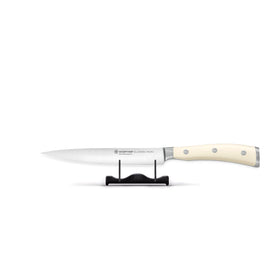


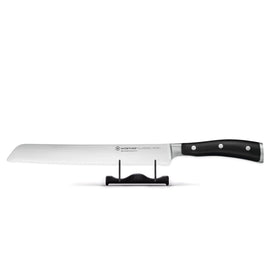
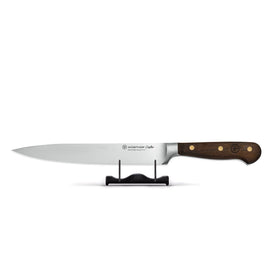
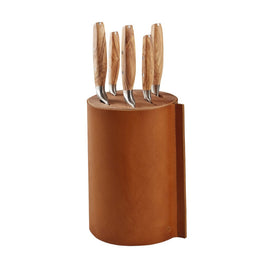
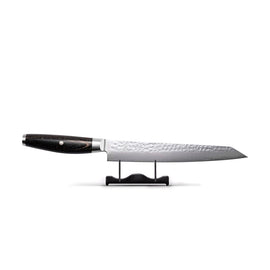
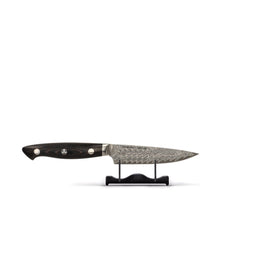
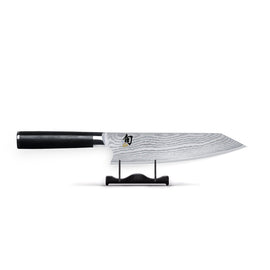
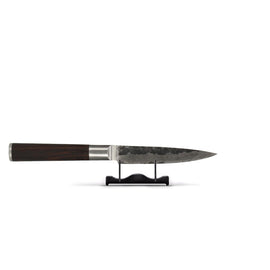
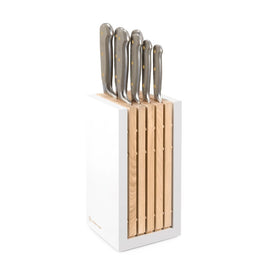
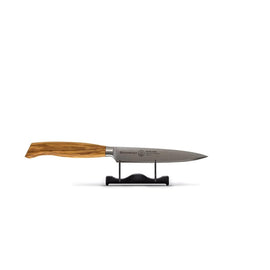



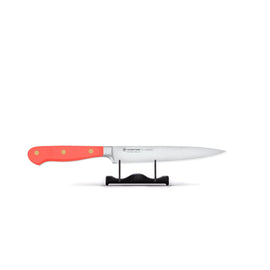


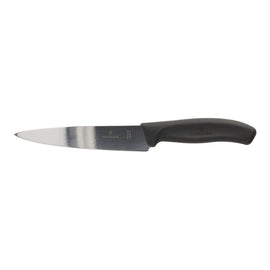
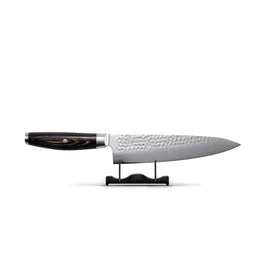
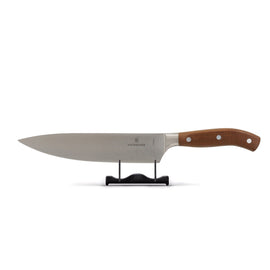
From the daily meal to a creative cooking creation. Kitchen knives are indispensable and everyone uses them in the kitchen. You probably also have one in a kitchen drawer or maybe you already have a nice collection of kitchen knives. Every kitchen knife is different, but they all have a blade (the part you cut with) and a handle. You can use them for various cutting tasks. There are kitchen knives for cutting vegetables, meat, bread, fish, sushi or poultry. You can read more about the types of kitchen knives below.
A kitchen knife set consists of several kitchen knives. The number of kitchen knives in a knife set can vary between 3 and 10 kitchen knives. The most common knives in a knife set are: bread knife, paring knife, vegetable knife, carving knife and filleting knife. So when you buy a kitchen knife set you are sure that you can cut all your ingredients from the dish.
The Japanese kitchen knives are very popular among the kitchen knives. Not only by professional chefs, especially hobby chefs like to cut their ingredients with a Japanese kitchen knife. That is not surprising because Japanese knives have many advantages compared to European knives. One of the main features of Japanese kitchen knives is the cutting angle. A Japanese kitchen knife has a sharper cutting angle, much sharper than the European version. As a result, these knives can be sharpened sharper and also stay sharp longer. Why are European knives not sharpened in the same way? Because they are not made of steel that can handle that. The Japanese kitchen knives, on the other hand, can. They are made of steel that is many times harder. Would you like to know more about the type of steel that allows the blades to be sharpened so sharply? Information about this can be found below.
The type of steel from which the Japanese kitchen knives are made is called Damascus steel. This type of steel was already used in the samurai era. Japan is a country that is not rich in raw materials, such as high quality metals. A low-quality steel sword or blade was not strong enough and broke off quickly. As a solution, a process has been developed in which several layers of steel are forged on top of each other. By forging the steel for a long time, more carbon is absorbed from the fire. The carbon provides the extra hardness of the forged steel. By folding layers of steel several times, the carbon is spread throughout the entire blade of the knife. The result is hard steel of high quality that can be sharpened at an acute angle. All KookGigant knife sets, except the print series, are made with 67 layers of damascus steel.
The hardness of steel is shown in HR scores. HR stands for rockwell hardness. A rockwell hardness test determines the hardness of the steel. This test is performed at the factory. Japanese knives have a higher HR score than non-Japanese kitchen knives. The HR score starts at 52 and ends at a maximum score of 68. The KookGigant kitchen knives have an average hardness of 61HR. This puts the knives in the second highest class of hardness.
Whatever you want to cut in the kitchen, a Japanese kitchen knife for it. KookGiant has a wide range of Japanese kitchen knives. The knives we sell are: Santoku , Nakiri , Kiritsuke , Sujihiki and Yanigaba.
The Nakiri is the Japanese vegetable knife. This knife is very suitable for wafer-thin cutting of vegetables. A Nakiri can be recognized by the rectangular blade without a point. This Nakiri knife has a hammered blade. The impacts of the hammer can be seen in the top half of the blade. This is not only aesthetic, but also has a function. Due to the hammered pattern, vegetables do not stick to the blade during cutting. With an even blade it sometimes happens that slices of vegetables stick. With this knife you can keep cutting without having to wipe your vegetables off the knife.
Just like the Santoku, the kiritsuke is a knife that can be used for multiple cutting tasks. The blade of a Kiritsuke is between that of a Nakiri and a meat or fish knife. The blade starts out rectangular, just like the Nakiri, but gradually becomes sharper towards a sharp point. Again, the steel makes the knife truly unique. The many layers of steel create a pattern with wavy lines.
The sujihiki is the Japanese version of the carving knife. The knife has a long blade for cutting larger pieces of meat. The blade is therefore extra long with a total length of 20 cm.
The Yanigaba is a traditional Japanese sushi knife and is used for fish, sushi and sashimi. The sushi knife is razor sharp and has a length of 22 cm. This allows you to cut perfectly straight pieces of sushi in one go. There is an edge halfway through the blade of the sushi knife. This edge is there for a reason. It ensures that no pieces of sushi stick during cutting.
A knife cuts best when it is sharp. The more you use a knife, the greater the chance that it will become less sharp. Logical, but that is why it is wise to sharpen kitchen knives. You can do this in different ways. You can sharpen a kitchen knife automatically with a knife sharpener or manually with a sharpening stone. An automatic knife sharpener has several grooves with different grain sizes. Which grain size you need depends on how blunt the knife is. In general, the blunter the knife, the coarser the grit should be. Is your kitchen knife still reasonably sharp, but do you think it could be a bit sharper? Then it is best to use a fine grain. It works exactly the same with a sharpening stone, only you do not sharpen automatically, but by hand.
Sharpening stones are also called whetstones. A sharpening stone always has two sides: a coarse and a fine side. The fine side is to keep the knife sharp and the coarse side for sharpening. From 240/800 to 3000/8000 grains per sharpening stone surface. 3000/8000 means that one surface of the stone contains 3000 grains and the other 8000. The more grains, the finer the sharpening stone. 240/800 is the coarsest sharpening stone for kitchen knives that are really blunt.
At the KookGigant you can choose from different collections of kitchen knives. Whether you are looking for a separate Japanese kitchen knife or a knife set . Our range is extensive and we can deliver from stock. We have the following collections of kitchen knives in our webshop:
The Damascus print series is one of the best-selling knife sets. Print means that the knife is not made of real damascus steel, but has a damascus print. The wavy pattern that Japanese kitchen knives are known for is printed on the blade of the knife. As a result, you can enjoy the beautiful wavy pattern of a Japanese kitchen knife for a bargain price.
Both series of kitchen knives have a blade consisting of 67 layers of hammered damascus steel. As a result, sliced vegetables, fish or meat never stick to the blade while cutting. The hammered steel also gives the blades a unique look.
Unique to the Micarta Jewels series is the Micarta jewelery bolster. These are several layers of linen that are pressed together with synthetic resin. This creates several colorful rings in the pakka wood handle.
In addition to the above knife sets, KookGiant also has the pakkawood and classic damask black series. The pakkawood series has a handle made of 100% pakkawood. The classis damask series has a black design handle made of black linen and synthetic resin.
Discover more from Cooking giant:
https://www.megacookingworld.com/collections/keukenmessen-sets
https://www.megacookingworld.com/collections/combideals-messenset-met-blok
https://www.megacookingworld.com/collections/koksmes
https://www.megacookingworld.com/collections/messenset
https://www.megacookingworld.com/collections/japanse-messen
https://www.megacookingworld.com/collections/santoku-mess
https://www.megacookingworld.com/collections/nakiri-mess
https://www.megacookingworld.com/collections/kiritsuke-messen